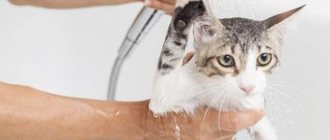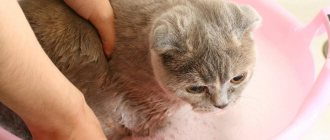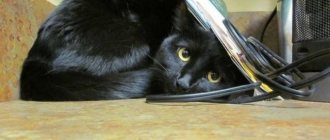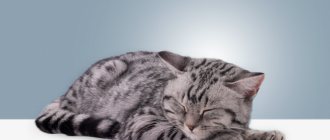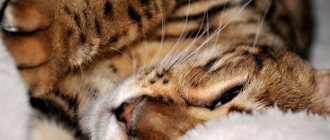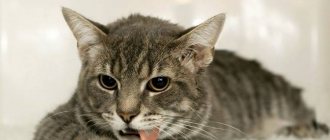Why pet fluffies develop a fear of water is interesting for any owner to know. Everyone knows that mustachioed individuals are excellent swimmers and, if necessary, can swim quite a long distance. A domestic predator does not mind hunting fish in an aquarium or touching an aquatic turtle in its habitat. But as soon as it comes to swimming, the phobia manifests itself with a vengeance.
Why cats don't like water
Experienced breeders, veterinarians and zoologists have long come to the conclusion that fluffies are not at all afraid of water as such. But there are various reasons why cats are afraid of water and don’t like to swim in it.
Temperature violation
The fur of a mustachioed friend is a kind of heat insulator, thanks to which he feels comfortable in any weather. If the hair is wet, it loses its protective properties, and the animal is left without a natural thermostat.
Bathing is scary primarily because the cat freezes after it. Violation of the protective air cushion leads to hypothermia of the body.
Moreover, it is more difficult for a mustachioed dog to dry out than for a dog. This is due to the peculiarity of the coat. Therefore, a bathed cat tries to lick itself faster in order to warm up.
Wet hair can also cause overheating. The air cushion prevents direct sunlight from reaching delicate skin, while wet fur does not have such properties.
Unstable position in the water space
Everyone knows that cats know how to land correctly on their paws when falling. However, while in the basin or bathtub, they are not confident in the abilities of their body. They have a slippery bottom under their paws, which makes it impossible for them to take a stable position.
A frightened purr cannot stand on all four limbs and balance with its tail. The owner holds the pet in such a way that he is not able to turn his head in the desire to examine what is happening. This frightens the animal very much and does not cause further desires to take a bath.
Inability to control the situation as usual
Pet purrs like to be in control and are always on the alert. During the washing process, it is difficult for them to maintain confidence in their own abilities. When wet, they feel defenseless, afraid of being attacked or aggressive by another creature.
This is the natural position of a domesticated pet, which has been formed over centuries. Only a mentally healthy pet that has been accustomed to the basin since childhood will feel comfortable while bathing.
Fear of liquid getting into ears, eyes, nose
The ear canals of a furry friend are different in structure from human ones. Therefore, fluid getting inside the ear brings not only discomfort and pain, but also serious problems. Most often, improperly bathed cats experience inflammation, otitis media, and develop dangerous ear infections.
Liquid getting into the eyes or nose causes acute pain in the pet. It is especially unpleasant if the water contains shampoo or other odorous chemicals. The mucous membranes begin to turn red, and irritation appears, which can bother the mustache for a long time.
Own and foreign odors
Wet wool emits a very intense aroma that even a person with a poor sense of smell can smell. For example, a family member suffering from chronic sinusitis or a chronic smoker.
Such a smell in natural habitats brings many problems to the animal, because it makes it defenseless against danger. In addition, a “fragrant” predator will not be able to count on a successful hunt.
Odors in the bathroom itself are also unpleasant for the cat. To him, the aromas of shampoo, conditioner and other chemicals seem many times more intense than to a person standing next to him. The smell of bleach emitted by tap liquid also repels your pet.
Instinct to protect against bacteria
Furry pets have very well developed natural instincts that protect them in different situations. They understand that wet wool becomes an excellent breeding ground for dangerous microorganisms.
From the surface of the body, these bacteria enter the stomach as a result of the pet’s natural desire to lick itself. As a result, the animal gets digestive problems and gastrointestinal disorders.
Of course, such problems cannot arise in purely domestic cats, but this cannot be explained by those with a mustache. Their desire to protect themselves from diseases is in their blood.
Fear of unusual sounds
The presence of unusual sounds in the bathroom also repels a mustachioed friend from taking bath procedures. So, a cat is afraid of the noise of water pouring from a tap or shower. Opening and closing a shampoo or conditioner bottle. Even the creaking of a rubber mat makes a wet individual want to be away from this place.
Evolution
Before they became pets, our purring pets were wild animals. They had to hunt in different conditions. However, most found their prey on land. The little predators had no need to swim for their dinner. They encountered water only as rain. And they hardly liked the fact that after a rain the cats became cold and wet.
But during the time that cats live with humans, which is 9,500 years, they have become unaccustomed to “wet” conditions. Therefore, the sensations when animals get into water can be called new for them. And it is wrong to say categorically that cats hate or are afraid of water. They are simply not used to such sensations.
Attitude of wild felines to water
Representatives of the cat family in the wild are both prey and predators. In the first case, they do not want to be tracked by scent. Since the enemy is ambushing the victim, they cannot have any scent to indicate their presence.
If wild specimens get wet, their fur will smell like swampy water. In addition, wet wool is excellent at collecting dirt and leaves. This means that a lot of extra time will be required for care. Therefore, wild cats are not very fond of water procedures.
However, even among wild representatives there are species that happily swim in bodies of water. For example, the speckled wiverine is not at all afraid of germs, disruption of thermoregulation and other consequences of getting wet. This individual will splash and dive deeply with great pleasure. Vivverins get their fish in this way. Another name for them is connected with this - fisherman.
There is another legend
Rats multiplied on the ark; at Noah’s request, the lion was supposed to catch them, but due to his size, he couldn’t cope with the task, he sneezed, and a cat appeared, which saved the ark from the invasion of rodents. One of the assumptions is also that the ancestors of domestic cats, the wild cats of the desert, avoided bodies of water. But, at the same time, there are species of cats that live along the shores of the seas, excellent swimmers and hunters in the water.
The ability to swim is inherent in the genes of all cats by nature itself. Kittens a few days old are already able to swim, instinctively moving their paws when immersed in water.
Breeds that favor water procedures
While not all Whiskered Purrs enjoy being in the water, some breeds enjoy swimming more than others. Moreover, their anatomical physique allows them to be excellent swimmers by nature.
Turkish Angoras are one of the breeds that love to swim, which is why they are often called “swimmers.” These representatives have a body perfectly adapted for being in an aquatic environment - they have long limbs with rounded paws.
Maine Coons are also big fans of baths, although they are considered one of the largest domestic breeds. Their robust bodies are suited to hold up well in unstable environments. Being in a filled bath, Maine Coons are happy to wallow and are ready to spend a lot of time there.
Bengals are also excellent swimmers, and because they are descended from Asian leopard relatives, they retain a natural instinct to splash and play in the water. They happily quench their thirst straight from the tap and are ready to sit in the sink all day in hot weather.
Sphynx cats do not have fur and therefore do not experience the inconvenience of getting wet. They tolerate bathing quite well, the main thing is to choose the right shampoos for them.
Representatives of the Rex breed have very short fur, which dries quickly after getting wet. A good-natured character, playfulness and a minimum of anger allow the owner to quickly accustom his curly pet to washing, especially if you put a toy in the basin or bathtub.
Other breeds that are ok with washing include the Kurilian, Japanese and American Bobtail, Norwegian Forest Cat, Mex and Abyssinian.
Cold and hot shower
When you take your pet in your arms, you always feel the warmth emanating from him. This is due to the fact that cats have a higher temperature than ours, and, therefore, the temperature of the water when bathing the animal must be made hotter than we are used to doing for ourselves. For a pet, this means washing in ice water. How many people do you know who will be grateful to you for a forced ice shower and will stand silently, not trying to escape? The skin receptors in a cat, like any other warm-blooded creature, perceive this as violence. And if they beat you, you have to run.
Cats don't really like the smell of perfume, especially if they start rubbing it into their fur. For small predators, such a fragrance is similar to the smell of fertilizers for us. Imagine if you started lathering your lady with something similar. It is unlikely that you would get away with scratches and a dissatisfied look.
How to train your pet not to be afraid of bathing
You need to get used to the process of bathing gradually. You should not bathe a kitten until 4 months of age - this can lead to severe hypothermia and a decrease in immunity.
Do cats need to be washed at all?
We must remember that the wild brothers and ancestors of modern domestic purrs were inhabitants of dry steppes who ate fresh prey and did not need additional drink. In addition, whiskers are very clean creatures that do an excellent job of tidying themselves up with the help of their tongue. By licking themselves, they break down contaminants with their bactericidal saliva and easily get rid of them.
A pet rarely needs to be washed by a person. Moreover, some veterinarians are against this procedure, because it is fraught with complications and is almost always accompanied by negative emotions.
You should not bathe your pet more than once a quarter, but it is better to carry out the procedure 2-3 times a year. The only exception may be an allergic reaction to the fur of a furry friend on the part of the owner and family members. Other reasons to wash your pet:
- the cat is not very clean;
- Dirt cannot be removed by regular licking;
- the wool gives off an unpleasant odor;
- ectoparasites (fleas, lice eaters, etc.) appeared on the body.
The need to use detergents is also associated with the prevention of skin diseases. In addition, if a handsome man with a mustache participates in exhibitions or championships, then he will have to be tidied up before each public appearance.
6 stages of training
A furry dog of any age will react negatively to the owner’s attempts to put him in the bath. Therefore, so that the cat is not afraid of water, it must be gradually accustomed to washing.
It’s good to start by introducing the mustache to the environment in the room. The animal must sniff everything, get used to unknown sounds and smells.
Experienced owners advise putting the animal in a dry bath and putting his favorite toys in there. Over time, the animal will stop panicking and running away. Then you can begin the first bath procedure. It occurs in several stages:
- Pour a few centimeters of water into a bathtub or basin and place a towel or mat there to prevent the mustache from slipping.
- Slowly lower the animal into the container.
- Wet your pet's fur. If he is calm, then you can turn on the shower.
- Lather your body with shampoo and massage thoroughly. Do not allow foam to get into your pet's ears, nose or mouth.
- Rinse off the shampoo and remove the cat from the container.
- Dry the wool with a towel and then wrap it in a dry sheet or other towel.
After bathing, it is not recommended to dry the animal's fur with a hairdryer. This can be scary and uncomfortable. The first wash should not last long. In the future, the duration of the procedure is determined individually.
The owners' fault
Often the owners themselves instill a dislike of bathing and a fear of water in their furry pets:
- The use of various cosmetic and hygiene products greatly irritates the delicate sense of smell of cats, whose olfactory function is extremely well developed. And the influence of a large amount of water is perceived by purrs on a subconscious, instinctive level as a potential threat, a blow, a danger from which they need to flee.
- When bathing a pet, owners least of all think about its comfort. The animal is placed in the bathtub, thoroughly washed with unpleasant-smelling shampoos, and then doused with a powerful stream of water from the shower. At the same time, the very design of the bathroom and the slippery coating deprive the cat of the opportunity to escape, sneak away or hide. As a result, bathing becomes a real stress for the animal, a psycho-emotional shock, which provokes a terrible fear of water in the future.
- The owners forcefully keep the cat in the bathtub, scold it for bad behavior, without giving it the opportunity to get acquainted with the water in a comfortable and calm environment.
The main causes of hydrophobia in cats
The main reasons why cats don't like bathing are as follows.
Possible hypothermia
Between the fur and skin of any cat there is a layer of air, which serves as a kind of insulating layer that prevents the body from hypothermia. But when the hairs get wet, they adhere tightly to the skin, become unable to retain air near the body, and the wonderful thermal insulation disappears. After all, even after washing in the bathroom, the pet begins to tremble, desperately freeze and strive to quickly dry the fur coat with its tongue in order to warm up and regain its ability to insulate.
Risk of overheating
Actually, this phobia is associated with the same reason - when natural thermal insulation is violated in a hot climate, sudden overheating occurs. After all, a cat has practically no sweat glands, and even by breathing frequently with its tongue hanging out, like dogs, it cannot quickly reach the desired body temperature.
Enhancing your own scent
The cat is a natural predator. Her increased attention to the cleanliness of her own body and fur is associated, among other reasons, with the hunter's instinct. After all, a pet licks itself, even if you just pet it.
The desire to remove all odors from oneself, to become invisible and imperceptible to potential enemies or victims is genetically in the animal’s blood.
When the fur gets wet, the cat's own fluids intensify. And it will take a lot of time to dry the fur and “disguise” again. This is another reason for the dislike of water.
Threat of attack
As a result, a wet cat with a strong-smelling wet fur will easily become the target of an attack by a larger predator. The reluctance to transform from hunter to prey forces the animal to avoid water.
Possibility of infection
Like any wild animal, a cat intuitively knows what is good for it in the world around it and what is dangerous. Wet wool instantly attracts dirt and dust, and it does not know what bacteria the water in the pond is contaminated with. The need to lick all this dirt from the fur makes the pet wary of bathing.
